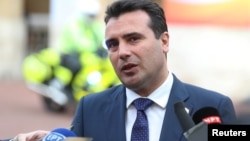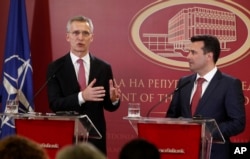NATO has officially invited Macedonia to initiate membership talks aimed at having the former Yugoslav republic join the Brussels-based North Atlantic alliance.
The long-anticipated invitation was announced shortly after summit meetings involving the heads of states from all 29 member nations.
Greece and Macedonia have been feuding over who gets to use the name since Macedonia's independence from Yugoslavia in 1991. Many Greeks say allowing the neighboring country to use the name insults Greek history and implies a claim on the Greek territory also known as Macedonia, a key province in Alexander the Great’s ancient empire.
As a result, Greece had blocked Macedonian efforts to join the EU and NATO. Despite recognition by 137 countries, Macedonia is officially known at the U.N. as the Former Yugoslav Republic of Macedonia (FYROM).
Last month, the two countries settled their dispute, opening the door for NATO to extend a membership invitation, triggering a round of talks that, if successful, would make Macedonia NATO's 30th member.
During discussions at an Atlantic Council forum held on the NATO summit side lines, Macedonian Prime Minister Zoran Zaev said getting to this point required decades of hard work by both nations.
“We believed some much in our integration into NATO and also ... in the European Union,” Zaev said, calling the deal a historic agreement. “We believed so much that we will have a new friend: our [southern] neighbor, to cooperate together to preserve the future for citizens of both countries.”
“This issue was a wall between us,” he added. “Now, I think we’ve moved mountains with this agreement and have shown our neighbors — and probably to the rest of the world — that even that kind of most sensitive question is possible to solve.”
A political rift among Macedonia’s 2 million residents, along with members of its global diaspora, had further complicated efforts to resolve the name dispute, and determining precisely what percentage of Macedonians supported resolution of the name dispute depended largely upon who was asked.
A 2018 survey by the Skopje-based Institute for Democracy, which is connected to a Brussels-based consortium of NGO's that advocate European integration, said an estimated 61 percent of Macedonians support resolving the name dispute if it expedites EU and NATO membership.
A 2018 survey conducted by the United Macedonian Diaspora (UMD), a Washington-based advocacy group whose public statements typically align with the nationalist-leaning opposition, said less than 10 percent of Macedonians support the name change.
On Wednesday, Greece expelled two Russian diplomats over allegations that Moscow has interfered in its negotiations with neighboring Macedonia. Moscow, which sees its influence in the Balkans diminishing, opposes Skopje’s efforts to integrate with Western Europe.
NATO Secretary General Jens Stoltenberg, however, said the option to join the alliance is now exclusively up to the Macedonian people.
“It’s up to (the) people of (the) Former Yugoslav Republic of Macedonia to decide,” Stoltenberg said. “This is a once in (a) lifetime opportunity. Either they support the agreement and then they can join NATO, or they don’t support the agreement, and then they will not join NATO. They cannot get both.”
“I welcome the agreement,” he continued, adding all internal procedures to secure accession have been marshalled. “We have clearly stated that when all the internal procedures are finalized, including changes in [Macedonia's] constitution, and implementing the name agreement with Athens, then (the) Former Yugoslav Republic of Macedonia can become the 30th member of NATO.”
The deal calls for Macedonia to formally change its name to the Republic of North Macedonia, which still must be approved by a referendum.
Clarification: A prior version of this article contained a reference to pro-Russian leanings within the Macedonian opposition that was potentially misleading. VOA regrets the error.
This story originated in VOA's Macedonian Service.






